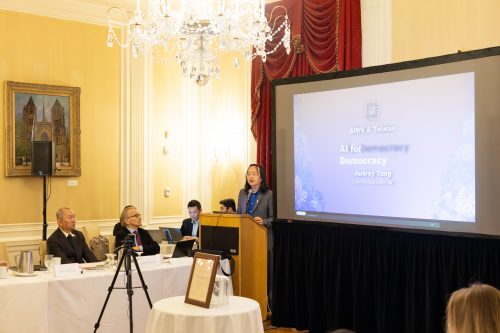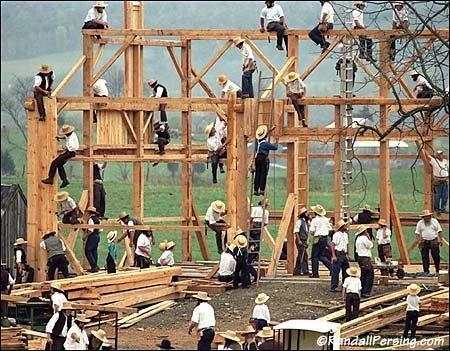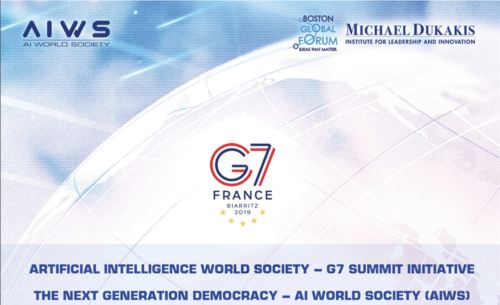Version 1.0, 05/05/2020
Nazli Choucri, Michael Dukakis, Tuan Anh Nguyen, Thomas Patterson, Alex Pentland, Nghia Trong Pham, David Silbersweig
I. A New Social Contract in the age of Artificial Intelligence
The term “artificial intelligence” refers to the theory and development of computer systems able to perform tasks that normally require human intelligence, such as visual perception, speech recognition, decision-making, translation between languages, self-driving cars, and so forth. Almost everyone recognizes that advances in AI have already altered conventional ways of viewing the world around us. This is creating new realities for everyone – as well as new possibilities.
These advances are powerful in many ways. They have created a new global ecology; yet they remain opaque and must be better understood. We have created new tradeoffs that must be assessed. We must now focus on critical principles and essential supporting practices for the new and emerging Social Contract 2020.
We must now re-think and consolidate the best practices for human development, recognizing the power and value of the individual and of society.
The expansion of innovations in and uses of Artificial Intelligence in almost all segments of human activity is well recognized, and it is evident that these will continue to change our lives in ways that we are yet able to imagine. At the same time, without some broad contours of guidelines or directives, undisciplined use of AI entails a number of significant risks to the health and wellbeing of individuals – damages to life-supporting properties, opaque decision-making, gender-based or other kinds of discrimination, control over private lives, and exploitation for criminal purposes – and seriously threatens the stability and security of all societies everywhere.
There is a clear awareness in the international community of the challenges and opportunities, as well as the problems and perils, of AI and many are seeking ways of managing their approach to AI. At least 20 countries have announced formal strategies to promote the use and development of AI. No two strategies are alike; however, there are common themes even among countries who focus on different aspects of AI policy. The most common themes addressed pertain to:
- Scientific research,
- Talent development,
- Skills and education,
- Public and private sector adoption,
- Ethics and inclusion,
- Standards and regulations, and
- Data and digital infrastructure.
Concurrently, AI is becoming a focus of foreign policy and international cooperation – for both developed and developing states. There is a shared view that no country will be able to compete or meet the needs of its citizens without substantial AI capability.
More important, many countries are now involved in technology leapfrogging rather than in replicating known trajectories of the past century. It is no longer expected, nor is it necessary, to replicate the stages of economic development of the West—one phase at a time. Countries now frame their own priorities and strategies.
In sum, all countries are going through a common experience of adapting to and managing unknowns. This commonality of shared elements results in a welcoming international atmosphere for a Social Contract 2020.
In a world as diverse as the one today, there are few mechanisms for responding to such possibilities on a global scale. Social Contract 2020 is designed to frame a common understanding anchored in general principles to help maximise the “good” and minimise the “bad” associated with AI. Derived from the general concept of social contract in the 18th century—and its various manifestations and formulations—Social Contract 2020 is framed in response to the new conditions of the 21st Century. The fourth Industrial Revolution is characterized by artificial intelligence, big data, IoT, and high-speed computation – and the innovations thereof.
Foundations
Just as the Social Contract of the 18th Century helped shape a new world, Social Contract 2020 also has a transformative vision: It transcends the technological features of artificial intelligence per se, and seeks to provide foundations for a new society — one based on the profound, widespread, ethical and just application of AI. (Note, for example, how the Covid-19 pandemic urgently requires a new society with new structure and order). Social Contract 2020 lays the foundation and standards for a new international system; it focuses on the conduct of each nation, relations with non-state actors (such as international business and not for profit entities), and the interconnection of nations (and their relations with organized entities) on a worldwide basis. While TCP / IP is the platform for communication among internet users, Social Contract 2020 can be seen as a platform for connection between governments, stakeholders, and private and public institutions.
Objective
The overall objective of Social Contract 2020 is to help build a multi-stakeholder AI- intensive society in all aspects of life from politics, governments, economics, business, and industry, all the way to the social order and the life of each individual. Social Contract 2020 eencourages everyone to value the acts of creation, innovation, philanthropy, and mutual respect. It seeks the respect and right to have freedom on, and access to, the Internet worldwide. The vision of Social Contract 2020 is to make our world a place of honest and responsible interaction. That means, a place where everyone’s contribution is recognized and everyone has a right to knowledge and access to information, where no one is above the law, where money cannot be used to subvert political process, and were integrity, knowledge, creativity, honesty and kindness are seen as key values in shaping decision and policy.
In short, Social Contract 2020 is for shaping a world where all stakeholders are recognized, and all forms of governance adhere these values and are accountable and transparent. It is a world where only by working together it is possible to address and resolve global challenges.
II. Principles
Extensive and appropriate AI application to politics, governments, society, and businesses can create a Smart Democracy supporting a global supply chain. The Smart Democracy Social Contract 2020 creates a platform for a new global supply chain, named Supply Chain 2020. As a critically important framework for society in the AI age, the Social Contract 2020 is based on balancing power among all stakeholders and among governments, businesses, civil society, individuals, and AI assistants. Being an important contract, the Social Contract 2020 is a commitment of main stakeholders to protect property, common values, and norms for good between nations.
a. AI is grounded in and must serve fundamental human rights such as human dignity and privacy protection.
b. AI systems must be considered from a multi-stakeholder perspective — for an individual and for society as a whole
c. Social Contract 2020 is an important tool to achieve sustainable and inclusive development for a global community that is fair, equitable, effective and prosperous.
d. It will also enhance prospects for Smart Democracy.
III. Commitments of Stakeholders/ Power Centers
(1) Individuals, Citizens, Groups:
· Everyone is entitled to basic rights and dignity that are enhanced/promoted by AI and the Internet Age and entail greater responsibilities.
Data Rights and Responsibilities:
· Each individual has the right to privacy and is entitled to access and control over their own data. Individuals have a right to organize ways of managing their data, individually or collectively, and the right not to hand in their data to businesses.
Internet Rights:
· Each individual has the right to access the Internet and any website or news system (recognized by governments of countries or not).
· Freedom of expression on the Internet.
· Secure digital identity, which allows the individual to know about and control access to trustworthy data about themselves.
Education and Political Participation:
· Each individual has the right to education through available venues.
· Each individual has access to education/knowledge/vocational training pertaining to the use and impact of AI.
· Each individual has the right to political participation.
Responsibility:
· Each individual is prohibited from exercising socially disruptive behaviors, such as hacking and disseminating disinformation.
· Each individual must contribute to the common health of society, through appropriate taxes and provide critical personal information (with appropriate safety guarantees) as is familiar in the collection of census data
(2) Governments:
· All government are expected to behave responsibly in the management of AI for governance and for interactions with individuals and such behavior must be easily auditable.
· Respect and implement AI governance of honesty, transparency, accountability to effect collaboration with international communities. These standards and norms are also to be applied in every area of governance.
· Create incentives for citizens to use AI in ways that benefit society (each person can do good work for society that will be recognized as value, and this value can be exchanged with other values such as financial value, products, services, etc.).
· Create norms/laws/rules to ensure AI benefits society.
· Create secure safety net for citizens affected by AI.
· Protect and promote IP rights without undermining movements toward free access of knowledge commons.
Connect between governments:
· Norms, values and standards of Social Contract 2020 are designed as connections among governments. To maintain the Social Contract 2020, it is essential to establish a Democratic Alliance for Digital Governance. The first countries of the Alliance should include US, Canada, UK, Germany, France, India, Australia, Japan.
United Nations and International Organizations:
· Extend the spheres of international organizations to include AI and extend the upholding of international standards/norms/practices pertaining thereto — UN Convention on AI, a Specialized UN Agency on AI.
(3) Business Entities. Business operations and related rights come with accountability and responsibility – nationally and internationally:
· Enable independent audits for honest transparency, fairness, accountability, and cybersecurity.
· Adopt common AI values, standards, norms, and data ownership rules, and expect penalties for noncompliance.
· Companies will be incentivized to do business only with companies and countries that respect, apply the Social Contract 2020, and Supply Chain 2020.
(4) Civil Society Organizations & Community. Rights and responsibilities of civil society organizations include;
· Monitoring governments and firms with respect to common values.
· Compliance with common values/norms/standards/laws.
· Support AI users and assist them to serve the broad interests of society.
· Create multi-stakeholder AI support and protection plans.
· Participate in the making of AI rules and norms.
(5) AI Assistants. AI assistants provide an interface to facilitate compliance with established standards.
· Support AI users and assist them to serve the broad interests of society.
· Engage with other power centers for mutual support and supervision.
· Community control: Behavior of assistants should be governed by communities of users.
IV. Implementation
· Ethics code for AI makers and AI users.
· A system to monitor and evaluate governments, companies, and individuals in the world (based on their contribution to maintaining norms, standards, common values, and international laws, for honesty, transparency, accountability, and responsibility with the world and in their nations and communities).
· This system is recognized by the United Nations and the international AI community.
· A New United Nations AI Convention established to obligate all stakeholders, including governments, to comply with international rules and norms to protect other stakeholder’s rights in AI age.
· Link compliance with AI rules and norms to the achievement of the Sustainable Development Goals.
· Build and develop Democratic Alliance for Digital Governance as global power to enforce the Social Contract 2020.
Download The Social Contract 2020, version 1.0, 5-5-2020 here










